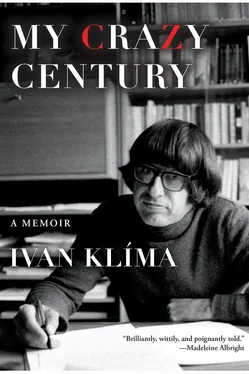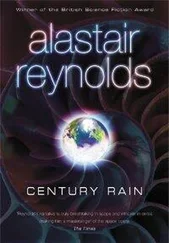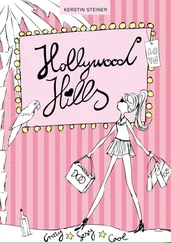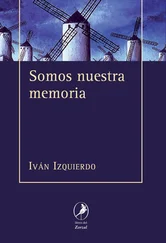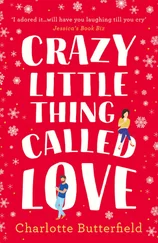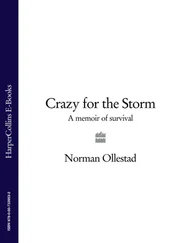It was difficult getting used to school. I bought notebooks and managed to borrow some textbooks from a couple of upperclassmen. Some of the books had been printed before the war, and when I paged through them I found entire paragraphs blacked out, which had obviously contained unpleasant facts or ideas during the period of the protectorate. There were, however, no other textbooks to be had.
Our homeroom teacher liked to talk to us about life and the value and meaning of our future endeavors. The old man was supposed to instruct us in mathematics, but when he turned his attention to his subject he would start mumbling. We couldn’t understand him, so we stopped paying attention. Since we had no idea that mathematics was a precise logical structure in which every breach threatened the entire construction, we neglected mathematics and clamored all the more insistently for him to talk about politics. Certain students would prepare questions that were meant to provoke him: Why didn’t the Americans come to help during the Prague Uprising? What did he think about the nationalization of the film studios? What did he think about the National Front — wasn’t that actually an undemocratic organization? Why did we have the National Police Force instead of police? Perhaps it was due to the feeling of sudden liberation after years of occupation, when he had to watch every word; perhaps it was an attempt to elevate us above our coarse natures, which had been intensified by our wartime experiences of violence; perhaps it was a belief that speaking about essential life questions and providing some life lessons was more important than mathematical equations — our teacher always let himself be provoked into speaking about things that had nothing to do with mathematics.
Fortunately, my father explained mathematics to me. And even though I excelled in it, I forgot everything later, whereas some of the teacher’s life lessons remain with me today. One of them concerned gambling. Whoever spends money on lotteries or gambling pays only the tax imposed by his own stupidity. Whoever has money to spare should be generous and help the poor, the sick, and those in need.
*
Sometime before Christmas we were paid a visit by Vlasta Kratochvílová. This woman, my father told me beforehand, was the bravest person he knew. She had risked her life many times over — to deliver mail to Terezín, to acquire needed medicines, and even to procure weapons.
I was expecting a heroic-looking woman, but when she arrived I beheld a quite ordinary woman, dressed somewhat provincially and about as old as my mother. She had brought with her some cakes she had baked and a Marbulínek picture book for my brother. To my surprise, she and my father kissed at the door, and then we sat at the table drinking real coffee (sent by my aunt in Canada) and munched on the homemade cakes. Mrs. Kratochvílová reminisced about the various people she had met and sometimes asked what had happened to them, but she always received the same reply: They were no longer alive; they didn’t come back.
Then she began to confide to Father her concern about what was happening. They were needlessly socializing everything, as if we hadn’t seen the chaos that ensued in Russia. She also didn’t understand why the Communists were behaving as if they alone had won the war. They were butting into everything and distributing false information about the resistance.
I could see Father didn’t like such talk, and if not for Mrs. Kratochvílová’s past he probably would have begun shouting at her, but instead he tried to explain that communism represented the future of humanity. The war had proved this. It was, after all, the Red Army that finally defeated Germany and chased the Germans out of our country. Only the larger factories, banks, and mines were supposed to be nationalized, and that was proper and just. Why should people be left to the mercies of some coal barons and the like who cared only about increasing their own profits? For them, the worker was merely a means. We needed a society that would ensure that nobody suffered, that people were able to live their lives with dignity. “I know what unemployment is. I worked at the Kolbenka factory and knew a lot of the workers. Most of them were masters of their craft, but they were let go anyway. What happened to them then? They went begging? Vlastička,” he addressed her almost tenderly, “I do not hide the fact that I am a Communist, and I’m proud of it.”
“But, Doctor,” she said in disbelief, “you can’t be serious. Do you think people are prospering under communism? I talked to their soldiers, and you wouldn’t believe the horrors they spoke of. They’ve got concentration camps there, for heaven’s sake. Nothing good will come from this quarter.”
Her words astounded me. Was it possible that someone would dare speak like this about our liberating ally? Tension suddenly filled the air, and Father said in a raised voice, “Mrs. Kratochvílová, I would never have expected you to spread Goebbels’s propaganda.” Then he launched into a long lecture about English and French colonialists, who lived off the exploitation of millions of slaves in India, Africa, and China. There they didn’t need to build any camps because the people were so poor they were living in a concentration camp already. The imperialists were not above even extracting work from children, whose wages amounted to a handful of rice.
Mrs. Kratochvílová said that it had never been like that in those countries, and even if what Father said were true, it did not excuse the atrocities taking place here or in Russia. After a moment she stood up. This time she didn’t kiss Father but merely shook his hand.
After she left, Father paced about the room repeating almost brokenheartedly: “She used to be such a courageous woman, and now look what’s become of her: a reactionary!”
*
At this time, entire gigantic tracts of land in the border regions were suddenly depopulated. I’d heard that interim governors had taken over some of the factories and enterprises, and entire divisions of the Revolutionary Guard carrying rifles and machine guns had set out for the border. In exasperation, Father said that instead of bringing life, these people had taken away everything that wasn’t nailed down. They weren’t called the Ransacking Guard for nothing. Of course, he quickly added that it wasn’t only the guards who showed up there but also those without land so they could finally acquire some property.
None of the new arrivals, however, could replace the millions who had been forced to leave. Crops, usually poor ones, stood abandoned in the fields with no one to harvest them. Soon an old military word found a new meaning: brigade .
Although I was born in the city and had never lived in the countryside, thanks to the brigades I enjoyed a significant amount of farmwork: I thinned out beets; harvested potatoes, cabbage, and onions; tied sheaves of wheat; worked with the threshing machine; labored on hay mounds; picked hops; and loaded trucks with hay. (They didn’t know about my hay fever and once sent me up to the hayloft. After a couple of seconds I was gasping for air — much longer, and I would have died.)
We did all of this work at the expense of our studies, but I thought harvesting, or rather saving crops from ruin, was much more important than agonizing over consecutio temporum in Latin sentences. The others did not share my opinion. I also welcomed every opportunity to escape the city and go somewhere near the forest.
Once our entire class arrived in a border village to help with the harvest. The trucks were arriving at the thresher, loaded with sheaves of grain. Our homeroom teacher selected four of us to pass the sheaves to a man who would toss them into the thresher. The man was a re-emigrant, a muscular farmer whose features were hidden behind a wet sponge he had attached to his face; clouds of dust poured from the thresher.
Читать дальше
